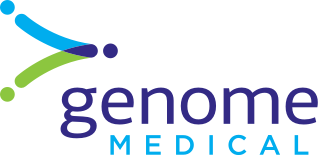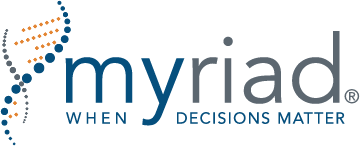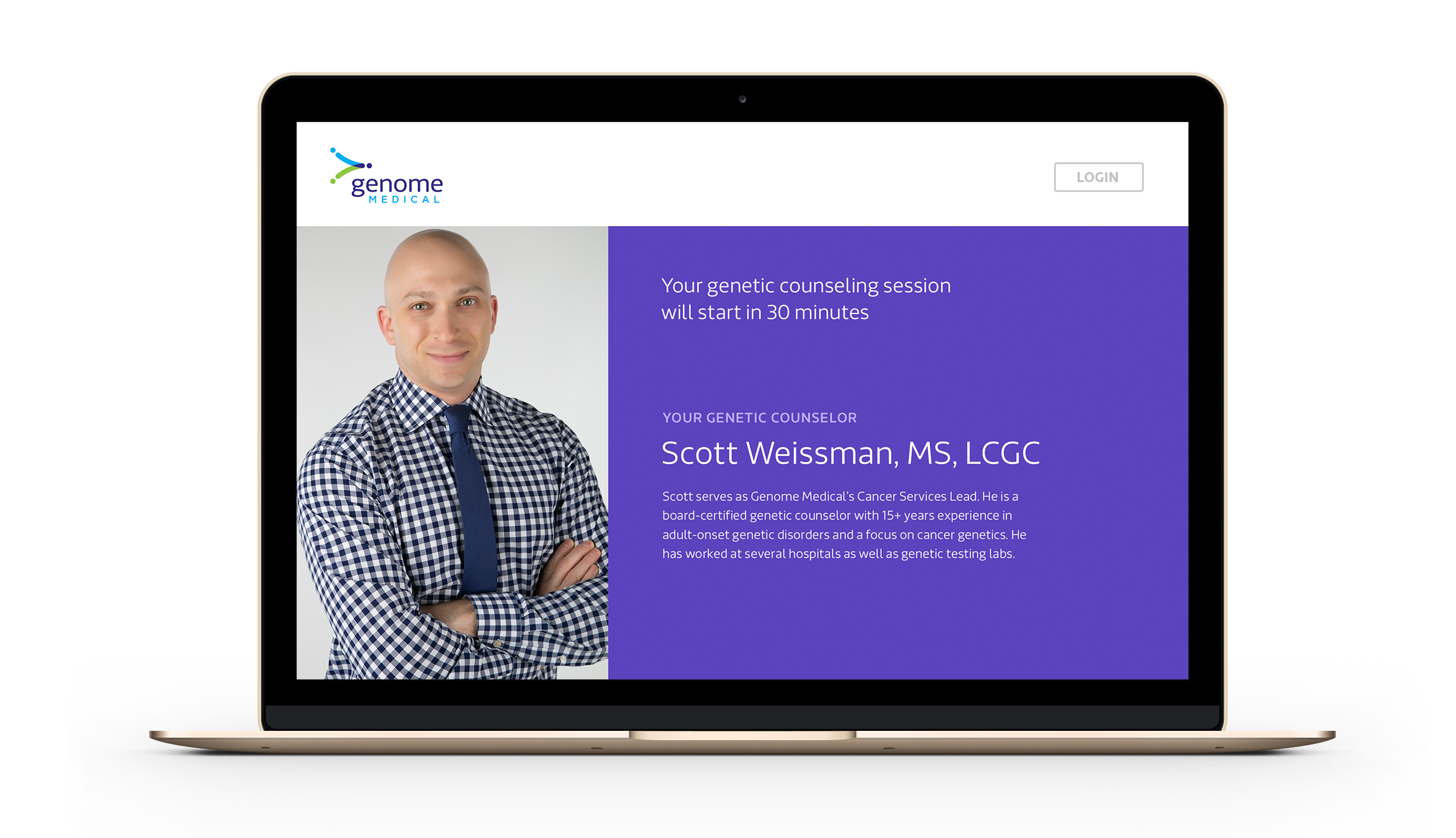

Know Your Genes,
Take Control of
Your Health
Schedule your consult with a certified genetic counselor to provide expert medical guidance as you review genetic testing options.
Get Started With a 1-on-1 Video or Phone Consultation
SCHEDULE NOWAverage of $50 with qualifying insurance.
$129 self-pay option available
Learn More
Benefits of Genetic Testing
When It Comes to Cancer,
Don’t Fight Fair
myRisk can provide insight into your cancer diagnosis.
Know Your Genes,
Know Your Options
myRisk provides knowledge so you can take control of your health.
How It Works
Cost
Both Genome Medical and Myriad have multiple billing options for you to choose from, including the ability to submit to your insurance. You will pay Genome Medical for genetic counseling and physician services, and you will pay Myriad for the cost of the test.
Genome Medical
(for counseling & MD services)
Insurance: We are a participating provider with some health insurance plans, and we can submit the claim to your insurance provider.
The amount you pay at the time of your session will be $50 or your specialty co-pay — depending on whether we are an in-network provider with your insurance.
Self-pay: Pay $129 for Genome Medical’s services after your session is completed, and skip billing your insurance provider.
Myriad
(for testing)
Cost should never be a barrier when patients need genetic testing. That’s why it’s Myriad’s promise to make it accessible and affordable for those who meet testing criteria:
97% of patients who undergo myRisk hereditary cancer testing are broadly covered.
Through excellent insurance and financial assistance, 75% of patients pay nothing out-of-pocket and 90% of patients pay $100 or less.
Frequently Asked Questions
Who is Genome Medical?
Genome Medical is the first nationwide specialty medical practice that is focused on genetics. The Genome Medical team features top genetic experts and primary care MDs—all dedicated to helping accelerate the integration of genetics into everyday health care.
What are the qualifications of the genetic experts at Genome Medical, and why should I consult with one?
Genome Medical’s national network of genetic experts includes both medical geneticists and genetic counselors. Your consultation will most likely be with a genetic counselor, who is a medical provider specially trained to understand the complexities of genetic tests and how to interpret an individual’s unique results. In certain cases, you may also work with a medical geneticist, a physician trained in general medicine, genetic diagnosis and the treatment of patients with genetic disorders. Genetic counselors start by learning what important health questions you have, assessing your risk for disorders of interest and then reviewing how genetic testing may help you answer them. Their recommendations are tailored to address the issues that are most important to you. If you have questions about your results, genetic counselors are there to explain what it means and work with you to understand best next steps and develop a care plan. You can learn more about genetic counselors here: https://www.youtube.com/watch?v=7yIW0L9dLCQ.
What is the value of a genetic consultation?
The goals of a genetic consultation are to assess your risk for genetic disease and to help guide you in making an informed choice about genetic testing.
How do I schedule my consultation?
To schedule a consultation with Genome Medical, please visit https://portal.genomemedical.com/registration/Myriad_dxTestingReferral or call 877-688-0992.
How long will it take to schedule an appointment with a genetic expert?
You can schedule a telehealth appointment at your convenience, generally within 24-72 hours. Please make sure to leave yourself enough time to complete the medical questionnaire before your appointment.
How can I prepare for my consultation?
Prior to your scheduled consultation, it would be helpful to think about your reasons for pursuing testing, and if you have any concerns regarding your family history that you were hoping to address. Please attempt to find out as much information as you can about your family history before the appointment and share that information with your genetic counselor.
What types of cancer can run in families because of genetics?
Although cancer is common, only 5-10% of it is hereditary, meaning an individual has inherited an increased risk for cancer from one of their parents. This inherited risk for cancer is caused by a small change (called a mutation) in a gene, which can be passed from one generation to the next in a family. When someone inherits this type of gene mutation from a parent, they have an increased risk to get a certain type (or types) of cancer.
Some cancers that can be hereditary are:
- Breast cancer
- Colon cancer
- Prostate cancer
- Ovarian cancer
- Uterine cancer
- Melanoma (a type of skin cancer)
- Pancreatic cancer
Family members share genes and may, therefore, share cancer gene mutations. Relatives with the same cancer gene mutation usually share an increased risk to get cancer.
Sometimes, a single gene mutation that increases the risk for cancer can increase the risk for more than one type of cancer. An example is a mutation in the BRCA1 or BRCA2 genes. Mutations in these genes are associated with an increased risk for breast, ovarian, prostate and other cancers.
Certain patterns of cancer can be signs of hereditary cancer in a family. Genetic experts are medical professionals trained to look for these signs and help you learn about your cancer risks. This may include talking about genetic testing and developing your best action plan to address your cancer risks.
If I’ve already had cancer or get checked for it, why would I consider speaking to a genetics expert?
Even if you have had cancer or get screening for it, you may still benefit from speaking to a genetic expert.
- Genetic experts are medical professionals trained to look for signs of hereditary cancer. They can determine your risk for a second cancer or a different type of cancer – maybe one you haven’t had, or that you get medical tests for. A genetic expert can help you better understand your risk for cancers that may run in your family, or reassure you about cancers that you may have thought could be inherited but typically aren’t. They can also fill any gaps in your cancer screening plan to ensure you’re getting everything you need. This may include genetic testing for you to consider.
- Genetic testing could tell you if you have inherited a risk factor for cancer. There are many genetic testing options available for hereditary cancer. A genetic expert can walk you through your best testing options, tell you about the pros and cons of testing and help you decide if you want to proceed.
- Genetic test results can be tricky to understand. Genetic experts can explain your results to you and then help you make an action plan to take full advantage of what you learned with your doctor.
- Genetic experts recognize that people often come to see them because they’re concerned about their family’s health. Genetic experts consider the whole family and can help you understand cancer risks that your family members could have, including:
- Helping you make a plan for talking to your family members about their cancer risks
- Helping to arrange genetic testing for interested family members
- Offering medical recommendations for your family members to reduce their cancer risks
I’m not sure I want to learn about my genetic risk for cancer. How could this help improve my, or my family’s health?
It’s understandable that you might hesitate to learn about your genetic risk for cancer. Sometimes it can be difficult to think about – even if part of you wants to better understand your risk or wants more information about how to reduce your risk. A genetic expert is a medical professional trained to help you learn about your inherited cancer risks, with the goal of improving your health. Genetic specialists recognize that learning about cancer risk isn’t always easy and offer compassion and support through the process.
Here are some ways that a genetic expert can help improve your health or your family’s health:
- A genetic expert is a medical professional trained to recognize and help you learn about your risk for cancer, which may be different than you think. Sometimes your actual cancer risk is higher – or lower – than you assumed. This information could make a difference in the medical care plan you’ve made with your doctor.
- A genetic expert will determine your cancer risks and talk with you about the option of genetic testing, if applicable. Talking about the pros and cons and focusing on the facts can be helpful as you consider your options.
- If you choose to have genetic testing, a genetic expert can explain your results to you. Then you can work together to make an action plan to take full advantage of what you learned with your doctor.
- Genetic experts create action plans based on medical guidelines and recommendations, which are tailored to you and your family. Ultimately, the goal is to improve your health by reducing your risk to get cancer.
Does an abnormal genetic test result mean I’m definitely going to get cancer?
Many abnormal genetic test results do not mean a 100% certainty for you to get cancer. Many genetic tests only tell you about your risk for cancer. This may be called an “abnormal” or “positive” test result, which can sometimes be confusing. Testing positive for a mutation in a cancer gene usually means that you have an increased risk to develop cancer, as compared to people without that mutation.
Some people with a cancer gene mutation never actually get cancer, but they do have an increased chance to get cancer over their lifetime. Because of this increased risk, people with a cancer gene mutation can often begin cancer screening/tests at an earlier age and have them more often, or pursue cancer prevention options, after learning about their increased risk.
1-on-1 Consultation
Whether you have a family history that you are concerned about or you are healthy and want to be proactive about your health, our experts will:
-
Help you understand how genetics may impact your health
-
Explore if genetic testing could be beneficial
-
Facilitate test ordering and sample collection
-
Help you understand how your genetic test results
impact your health and your family

